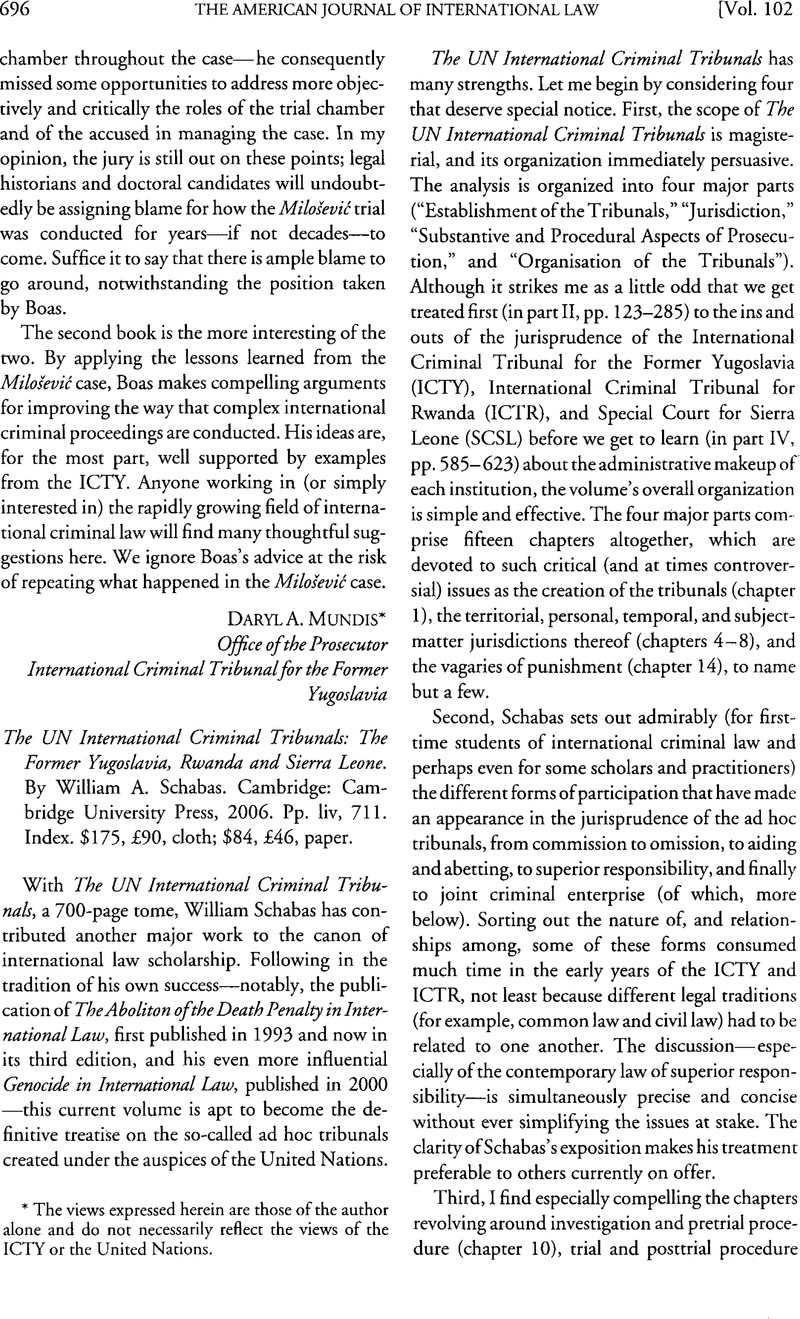Published online by Cambridge University Press: 27 February 2017

1 Prosecutor v. Tadic, Case No. IT-94-1-AR72 (Oct. 2, 1995).
2 Prosecutor v. Hadžihasanović., Case No. IT-01-47-AR72 (July 16, 2003).
3 Assembly of State Parties, International Criminal Court, Strategic Plan for Outreach of the International Criminal Court, ICC Doc. ASP/5/12 (Sept. 29, 2006).
4 Prosecutor v. Stakic, No. IT-97-24-T (July 31, 2002); Prosecutor v. Brdanin, No. IT-99-36-A (Mar. 19, 2004); Prosecutor v. Rwamakubo, No. ICTR-98-44-AR72.4 (Oct. 22, 2004).
5 Alexander, Zahar & Göran, Sluiter, International Criminal Law (2008)Google Scholar; see also Allison, Marston Danner & Jenny, S. Martinez, Guilty Associations: Joint Criminal Enterprise, Command Responsibility, and the Development of International Criminal Law , 93 Cal. L. Rev. 75 (2005)Google Scholar; Jens, Meierhenrich, Conspiracy in International Law , 2 Ann. Rev. L. & Soc. Sci. 341 (2006).Google Scholar
6 Jack, L. Goldsmith & Eric, Posner, The Limits Of International Law (2005).Google Scholar
7 Kathleen, Thelen & Sven, Steinmo, Historical Institutionalism in Comparative Politics , in Structuring Politics: Historical Institutionalism in Comparative Analysis 3 (Sven, Steinmo, Kathleen, Thelen, & Frank, Longstreth eds., 1992)Google Scholar; see also Mark, C. Suchman & Lauren, B. Edelman, Legal Rational Myths: The New Institutionalism and the Law and Society Tradition , 21 L. & Soc. Inquiry 903 (1996).Google Scholar
8 Overviews are contained in Malcolm, Rutherford, Institutions in Economics: The Old and the New Institutionalism (1994)Google Scholar; The New Institutionalism in Organizational Analysis (Walter, W. Powell & Paul, J. DiMaggio eds., 1991)Google Scholar; Paul, Pierson, Politics in Time: History, Institutions, and Social Analysis (2004).Google Scholar
9 James, G. March & Johan, P. Olsen, The New Institutionalism: Organizational Factors in Political Life , 78 Am. Pol. Sci. Rev. 734, 738 (1984).Google Scholar
10 Mark, Findlay, Synthesis in Trial Procedures? The Experience of International Criminal Tribunals , 50 Int’l & Comp. L.Q. 26 (2001)Google Scholar; Kai, Ambos, International Criminal Procedure: “Adversarial”, “Inquisitorial” or Mixed? 3 Int’l Crim. L. Rev. 1 (2003)Google Scholar; M., J. Chrlstoph Safferling, Towards an International Criminal Procedure (2001).Google Scholar
11 For an introduction to the phenomenon of the “international judge,” see Daniel, Terris, R., P. Cesare Romano, & Leigh, Swigart, The International Judge: An Introduction to the Men and Women Who Decide the World’s Cases (2007).Google Scholar
12 John, Hagan, Justice in the Balkans: Prosecuting War Crimes in the Hague Tribunal (2003).Google Scholar
13 Victor, Peskin, International Justice in Rwanda and the Balkans: Virtual Trials and the Struggle for State Cooperation (2008).Google Scholar
14 Rachel, Kerr, The International Criminal Tribunal for the Former Yugoslavia: An Exercise in Law, Politics, and Diplomacy (2004).Google Scholar
15 Paths to International Justice: Social and Legal Perspectives (Marie-Bénédicte, Dembour & Tobias, Kelly eds., 2007).Google Scholar
16 Marie-Benedicte, Dembour & Tobias, Kelly, Introduction: The Social Lives of International Justice , in Paths to International Justice: Social and Legal Perspectives, supra note 15, at l, 8.Google Scholar
17 Dembour & Kelly, supra note 16.
18 In the philosophy of science, nomothetic reasoning refers to reasoning that proceeds by way of deduction. It is theory driven and motivated by a desire to account for an entire class of events, processes, or outcomes (for example, the performance of international courts and tribunals in general). The aim of nomothetic reasoning is the elaboration of universal laws of behavior. By contrast, ideographic reasoning proceeds by way of induction. It is problem driven and motivated by a desire to account ioi particular processes, events, or outcomes (for example, the performance of the ICTY trial chamber in the prosecution of Milosevic). The aim of ideographic reasoning is the elaboration of detailed and fine-grained accounts of select cases.
19 Gideon, Boas, The Milošević Trial: Lessons for the Conduct of Complex International Criminal Proceedings (2007)Google Scholar [Editor’s note: Boas’s book is reviewed by Daryl Mundis in this same issue of the Journal.]
20 For an interesting comparative analysis of the ICTY and ICTR by a political scientist that ultimately fails to penetrate the inner workings of the ad hoc tribunals, see Peskin, International Justice in Rwanda and the Balkans, supra note 13. Also disappointing from this vantage point is Kerr, The International Criminal Tribunal for the Former Yugoslavia, supra note 14.
21 Georg, Henrik Von Wright, Explanation and Understanding (1971).Google Scholar